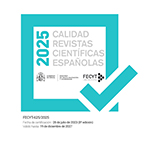Desafiando el imaginario carcelario en la era digital
Asimetrías epistémicas y derecho al olvido
Resumen
Este artículo sostiene que los debates sobre las protecciones legales para preservar la privacidad de los interesados, como los que involucran el derecho al olvido de la Unión Europea, han tendido a pasar por alto las formas de asimetría epistémica a nivel de grupo y su impacto en los miembros de grupos históricamente oprimidos. Ante esto, desarrollo lo que considero un enfoque abolicionista de los problemas de justicia digital. Empiezo explorando los debates internacionales sobre la privacidad digital y el derecho al olvido. Luego, paso a la larga historia de asimetrías de información que impactan a las poblaciones racializadas en los Estados Unidos. Estas asimetrías, sostengo, comprenden injusticias epistémicas que también están implicadas dentro de los patrones de encarcelamiento racializado en los Estados Unidos. La sección final reúne preguntas sobre el impacto de tales injusticias epistémicas en las personas encarceladas y se centra específicamente en la disponibilidad pública de antecedentes penales en bases de datos de búsqueda en línea como un tema fundamental dentro de las conversaciones sobre justicia digital. Por lo tanto, concluyo construyendo a partir del trabajo de los escritores abolicionistas contemporáneos para argumentar que las preocupaciones subyacentes de un derecho al olvido individualizado deben transformarse en un esfuerzo colectivo para socavar los imaginarios carcelarios de la sociedad.
Descargas
Descarga artículo
Licencia
La revista Las Torres de Lucca. International Journal of Political Philosophy, para fomentar el intercambio global del conocimiento, facilita el acceso sin restricciones a sus contenidos desde el momento de su publicación en la presente edición electrónica, y por eso es una revista de acceso abierto. Los originales publicados en esta revista son propiedad de la Universidad Complutense de Madrid y es obligatorio citar su procedencia en cualquier reproducción total o parcial. Todos los contenidos se distribuyen bajo una licencia de uso y distribución Creative Commons Reconocimiento 4.0 (CC BY 4.0). Esta circunstancia ha de hacerse constar expresamente de esta forma cuando sea necesario. Puede consultar la versión informativa y el texto legal de la licencia.









